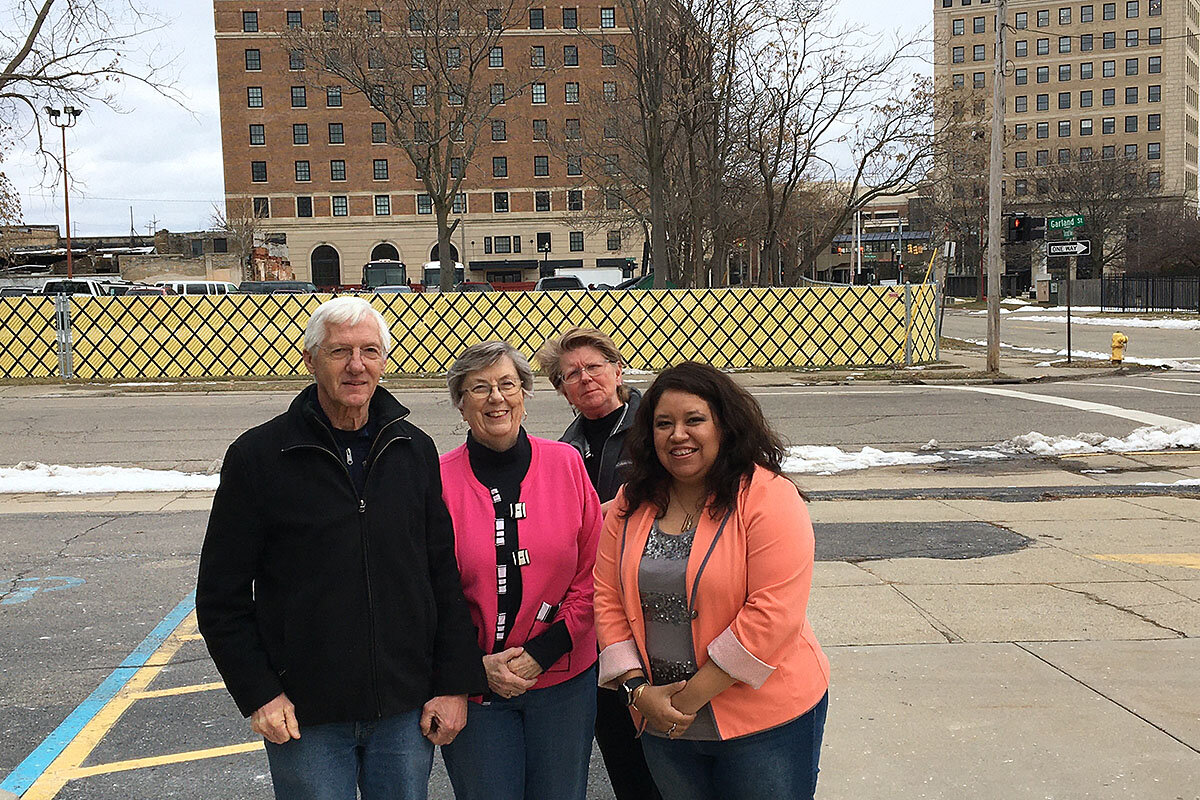Six years on, Flint works toward justice in water crisis
| Flint, Mich.
Water coming from faucets in this city is no longer discolored or malodorous. Truckloads of bottled water from other communities have slowed to a trickle. These improvements do not mean that Flint’s water crisis is over. Instead, a new and uneasy normal has settled in.
“One of the lingering effects is the pall that has been cast over this city,” says the Rev. Deborah Conrad, pastor of Woodside Church, a multidenominational congregation in the heart of downtown Flint. “It’s a kind of a depression, an unwillingness to trust. There are lingering mental and physical effects we cannot measure and won’t know for a long time.”
The persistent mistrust from citizens is directed squarely at government officials who were the key players in what a federal appellate court opinion called “the infamous, government-created disaster commonly known as the Flint Water Crisis.” Those officials – at all levels – are at the center of an ongoing question that transcends partisan politics in this city of just under 100,000: What would constitute justice in the Flint water crisis?

“There’s no easy resolution to this,” says Barry Rabe, a professor of public and environmental policy at the University of Michigan. “Court cases take time. Cleaning up the water system takes time. There’s certainly a real loss of public confidence among the citizens of Flint toward any governmental authority. So it’s not just a question of a short-term engineering fix. It’s a rebuilding of public trust and confidence.”
In April 2014, a state-appointed emergency financial manager with power to supersede local authorities switched Flint’s water supply from the city of Detroit to the Flint River, a move that was expected to save the cash-strapped city money. This water was processed without adding anti-corrosive chemicals and then pumped through the city’s aging pipes. The result was a water supply linked to skin rashes, hair loss, lead poisoning, and an outbreak of Legionnaires’ disease blamed for 12 deaths.
Nearly 80 lawsuits have been filed against the state of Michigan, the city of Flint, and the federal Environmental Protection Agency. A few citizens have hired their own attorneys, but the vast majority have joined in a class-action suit. Attorneys for the state and city were attempting to have the civil cases dismissed and had appealed a decision by the 6th U.S. Circuit Court of Appeals to allow some of the cases to continue. In late January, the U.S. Supreme Court refused to review the lower court’s decision, meaning that the civil cases can now proceed.
The courtroom battles revolve around two conflicting legal doctrines: bodily integrity and qualified immunity. The plaintiffs are alleging that their civil rights under the 14th Amendment’s due process clause were violated. In particular, they maintain that their bodily integrity was harmed by decisions made by the officials based solely on saving money and without regard to human health.
The water crisis was another blow to Flint, which calls itself Vehicle City in reference to its former prominence in world automobile manufacturing. The decline of the U.S. auto industry led to a corresponding decline in the city’s population, which has dropped sharply from a high of 196,940 in the 1960 census to 95,943 in a 2018 census estimate.
A right to clean water
Theodore Leopold of the law firm Cohen Milstein, one of the lead attorneys for the plaintiffs in the class-action suit, says bodily integrity refers to the protection of citizens’ “inherent and constitutional rights, such as the ability to have clean water and that one group should not be segmented over another from having these rights.” Mr. Leopold says his clients are seeking justice for individual injuries along with damages to personal property and businesses affected by water contamination.
Attorneys for the defendants claim a qualified immunity protects them from liability for their decisions. The 6th Circuit ruled that any claim of qualified immunity was overruled by what was perceived as the egregious conduct of the government officials.
Initially, criminal charges were brought against eight government officials. Last June, Michigan Attorney General Dana Nessel dropped these charges, saying the original investigation begun by her predecessor, Bill Schuette, was too flawed to pursue. Those officials may not yet be in the clear. Ms. Nessel’s office is not commenting on the specifics of any future litigation, but communications director Kelly Rossman-McKinney says work is underway in both criminal and civil arenas.
“We recently opened a satellite office in Flint where members of our team are able to meet with community members as we move forward,” says Ms. Rossman-McKinney.
Government officials named in the criminal charges included two of the emergency managers appointed by the state for Flint. Six other officials in the state Department of Environmental Quality and the Department of Health and Human Services faced charges alleging covering up testing data and emails. Complaints against higher-level government officials, including former DEQ Director Dan Wyant and former MDHHS Director Nick Lyon, were dismissed by the U.S. Court for the Eastern District of Michigan.
Peter Jacobson is professor emeritus of health law and public policy at the University of Michigan. He was a consultant for the legal team defending Mr. Lyon, who was facing criminal charges of misconduct in office and involuntary manslaughter.
“One of the reasons I wanted to be one of Nick’s lawyers was that I felt charging health department officials criminally would have serious adverse public health consequences,” says Mr. Jacobson, adding that the charges against Mr. Lyon and another MDHHS official, Eden Wells, were never provable. “The Flint community wants retribution and accountability. I agree with that. But what does that mean? Sure, they want to see Nick go to jail, but that doesn’t solve anything.”
“Public health is already a risk-averse profession. The fear of a criminal prosecution if you get it wrong will have a chilling effect, not just on day-to-day activities but on broader questions. Take the coronavirus issue: Do you really want a health department to be bashful and risk-averse in confronting this disease because it doesn’t have the community’s trust?”
An even tougher undertaking
Flint residents are watching as their city undertakes the arduous task of rebuilding its water infrastructure. Rebuilding public trust in government institutions and personnel may be an even tougher chore. Although water testing data show that lead levels are at safe levels, residents are still cautious, buying bottled water at stores and subscribing to outside water delivery services. The ongoing work of replacing the city’s piping system has also had its glitches, including complaints of property damage by workers.
“When the homeowner isn’t there, the workers are not able to get into all the houses to replace all the pipes,” says Ms. Conrad, the pastor. “If they can’t replace all the pipes, the water system is not 100% secure. It’s kind of like justice. There’s no justice for anybody if there’s no justice for everybody.”
The trust issue has a unique impact on the city’s Hispanic community. At the height of the crisis, when efforts were made to canvass residences for distribution of water filters and inspections, many unauthorized immigrants would not come to the door, says Juani Olivares, president of the Genesee County Hispanic Latino Collaborative. Local charities pitched in to purchase water filters for distribution to the affected immigrants.
Public policy staff, and health workers in particular, will be walking point in the effort to regain public trust and restore a sense of justice. The job won’t be easy, according to Professor Rabe, who uses the Flint saga in his course on performance management.
“It’s not clear to me that in Flint you could reinvent trust where people feel the matter is resolved or they have received some compensation accordingly,” says Professor Rabe. “This is one of those classic environmental health stories where I fear public trust for government has been harmed, if not shattered.”
If the class-action lawsuits succeed, judgment will likely entail a financial payout to be shared with the thousands of plaintiffs who are part of the class. But the litigation is not about financial gain, according to some Flint residents.
“Justice means that some people are held accountable,” says longtime Flint resident Karen Eaton, a member of Woodside Church who lives in a house built in 1920 and who is part of the class-action lawsuit. “I’m 77 and I’ve never experienced this kind of dismissiveness before. I’ve never felt I wasn’t important enough to pay attention to. Somebody needs to be held accountable.”
Editor’s note: The caption for one of the photographs has been revised so that it lists the correct order for the four individuals shown in the picture.





